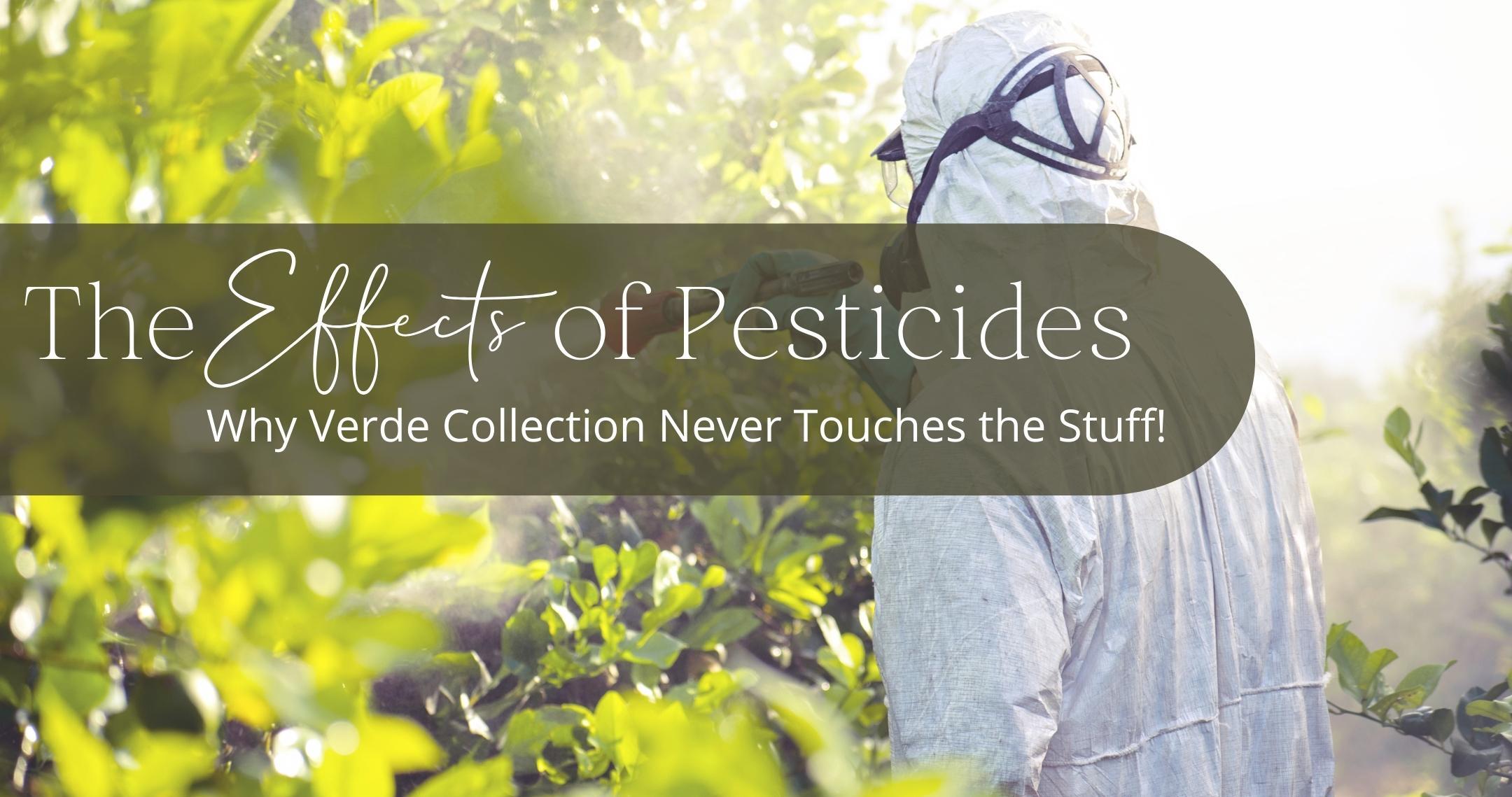The Effects of Pesticides on Your Health

What Are Pesticides, and How Are They Used?
Pesticides are chemicals used to kill different kinds of “pests” and living things. For this reason, some people also call them “biocides” since they don’t just eradicate pests; they also kill various other forms of life. Their targets might include insects, bacteria, algae, rodents, and weeds, most of which live by feeding on or competing with the plants that humans grow for themselves. They’re used primarily in agriculture to keep pests from destroying crops. Many people also use pesticides on plants and in gardens at their homes. Public areas like schools, parks, and playgrounds are also commonly exposed to pesticides.
Here are some of the many types of pesticides.
- Herbicides kill or prevent the further growth of weeds and other unwanted plants. Most herbicides are relatively indiscriminate and will kill any plant sprayed on unless it has been genetically engineered to withstand them.
- Fungicides target fungi that can damage plants, like mold, rust, and mildew—biochemical companies designed these to disrupt cell energy production or damage fungal cell membranes.
- Insecticides may kill, repel, or otherwise harm various species of insects. Some attack the insect’s nervous system, and some can damage the insect’s exoskeleton.
- Disinfectants control pathogens like viruses and bacteria. You may use disinfectants in your home to clean countertops and bathrooms, and they’re often used to rid surfaces of germs after someone has been sick to help prevent the spread of illness.
Pesticides are Everywhere — and in Everything
There are over 1,000 pesticides around the world. The United States uses over one billion pounds of pesticides every year. Worldwide, that number is approximately 6 billion pounds. Each has different applications, properties, and toxicological effects.
Outside of direct occupational contact through agriculture and landscaping, most people expose themselves to pesticides through everyday activities, like eating food and drinking water.
This fact is an excellent reminder of how everything in our global food system is connected. And nothing we do to our environment is without consequence regarding public health.
GMOs
Genetically modified organisms (GMOs) have dramatically increased overall pesticide use. Some GMO plants have been engineered to produce pesticides, like Bacillus thuringiensis (Bt), an insecticide. It has been used judiciously in organic agriculture for some time. But with some GMO crops, you can’t wash them off. It’s in every cell of the plant.
Other GMO crops have been modified to be herbicide-tolerant, leading to a dramatic increase in herbicide usage. Weeds can become resistant to herbicides over time, much like bacteria become resistant to antibiotics. As a result, more glyphosate and other herbicides are then necessary. Newsweek reports that in 1987, U.S. farms used 11 million pounds of glyphosate. But now, nearly 300 million pounds are applied each year.
Pesticide Effects
Pesticides are designed to have a near-immediate and generally lethal effect on pests. But unfortunately, that’s not all they do. Remember that pesticides target living organisms; biologically speaking, we have a lot in common with insects, bacteria, and plants. And while pesticides are often studied for their effects in isolation, the reality is most of us experience exposure to more than one at a time. A 2016 study from the UCLA Sustainable Technology & Policy Program reported that human health risks from simultaneous exposure to drift-prone toxic chemicals like 1,3-D, chloropicrin, and metam sodium (a methyl bromide replacement), may be significantly more significant than the added risks of the individual chemicals.
7 Health Impacts of Pesticides
Decades of sound research have shown a definite link between the use of pesticides and long-term, detrimental health impacts on humans.
1. They can increase your risk for, and even cause, certain types of cancers.
Studies have shown that pesticides like organochlorines, creosote, and sulfamate are carcinogenic, while DDT, chlordane, and lindane promote the growth of tumors. Many pesticides also contain arsenic, which is a known human carcinogen.
2. They can lead to severe respiratory problems.
A 2013 review published in the International Journal of Environmental Research and Public Health found that people who use pesticides regularly as part of their job have been shown to have a higher risk of developing breathing problems, including impaired lung function, asthma, and chronic bronchitis. There is also some evidence of an association between pesticides and lung cancer.
3. They might cause damage to your kidneys and even lead to kidney disease.
A 2017 review in Environmental Health looked at 21 studies on chronic kidney disease and pesticide exposure. Researchers found that 62% of the studies indicated a positive association between the two, although potential confounding factors and lack of lifetime exposure assessment made it difficult to draw definite conclusions.
4. They can result in cognitive decline and lead to brain disorders.
Not surprisingly, pesticides aren’t good for your brain either. Short-term, high-dose pesticide poisoning is known to have toxic effects on your nervous system. Other research indicates that long-term exposure may also increase Parkinson’s disease. In one study, researchers concluded that exposure to certain pesticides could cause a 250% increased risk of developing Parkinson’s.
5. They can cause severe birth defects.
If the effects of pesticides used in warfare weren’t convincing enough, a 2017 study in Nature Communications looked at 500,000 birth records for people born in California’s San Joaquin Valley between 1997 and 2011, as well as pesticide use in the area. They found that significant pesticide exposure (~4200 kg throughout pregnancy) increased birth defects by five to nine percent.
6. They can have lasting, disrupting effects on your hormones.
Pesticides interfere with the normal function of your endocrine system, which can negatively affect sexual and reproductive function. Exposure can also increase the risk of infertility, low birth weight, fetal death, and certain childhood cancers.
7. They can increase the risk of developing autism.
A 2019 study of 2,961 people with autism spectrum disorders found that the risk for autism increased from exposure to surrounding pesticides within a 1¼ mile radius of where the mother lived while pregnant. These babies were compared to women within the same agricultural region without this exposure. Researchers concluded that infant exposure to pesticides during gestation could increase autism risk. Other studies tell us that mothers living close to fields treated with pesticides are more likely to have premature babies and children with autism, impaired cognitive function, and other neurodevelopmental disorders.
5 Environmental Impacts of Pesticides
Pesticides don’t just affect you, me, and other humans. They also impact our environment in profound ways, too.
How?
1. They kill essential pollinators.
The best-known pollinators are honey bees, which fly from flower to flower, releasing pollen. Did you know that pollination by honey bees is essential for the growth of many types of our food? The effect of pesticides on bees is so well known that chemicals now have labels for their direct bee toxicity. Some of the worst pesticides include neonicotinoids, which are toxic to insect brains. Fungicides have also been shown to reduce the number of good gut bacteria in bee larvae and to make it harder for bees to get nutrients from pollen.
2. They disrupt the food chain and essential ecosystems.
Excessive pesticide use destroys land and trees, kills insects, and causes fish to leave their habitats. Some of these nasty chemicals can even turn grass into poison for wild animals who eat it.
3. They kill the soil and degrade the nutritional content of food and crops.
Pesticides degrade soil — meaning the quality significantly declines — reducing its nutrients, including potassium and nitrogen. This imbalance harms the snakes, frogs, earthworms, snails, and birds, who rely on the soil as a critical component of their ecosystem. Degraded soil can become unable to sustain crops, and even when it can, the nutritional value of food grown in it decreases.
4. They contaminate the water supply.
Pesticides don’t just come in contact with plants and insects and disappear. These chemicals can enter the groundwater in several ways, such as leaching, erosion, run-off, assimilation by microorganisms, and plant uptake.
5. They’re also bad for farmworkers.
Despite the evidence that even low amounts of pesticide exposure are toxic to people, the EPA does not routinely monitor the health risks to farmworkers. Yet, these people use these chemicals every day and are exposed to much higher levels than most consumers will be.
Many farmworkers also inadvertently expose their families to toxic chemicals by bringing residues home on their shoes and clothing. Several studies show that children of farmworkers routinely endure higher pesticide exposures than consumers. Due partly to these pesticides, farmworker families may be more likely to experience symptoms of acute pesticide exposure. Symptoms may include early puberty, cognitive impairments, adverse birth outcomes, and neurodevelopmental disorders in children. How painfully ironic that the people most endangered by toxic chemical exposure are working to feed the world!
Pesticides protect crops from bugs and weeds, thus helping to grow food for people. But we are learning that most of the synthetic pesticides in widespread use today create their problems — including toxicity to people, bees, and other living things.
Taking on conventional pesticides is a big fight. Many of the world’s most influential companies still make billions of dollars selling them. And many farmers around the world are dependent on ever-increasing amounts just to keep the evolving pests at bay. But when you act to protect yourself and your family, you’ll also help to protect farmworkers from cancer, pollinating bees from collapse, and to build a healthier world for future generations.
Related Topic Products:
Tinctures (Drops): 1200mg Natural | 1200mg Wild Orange | 2500mg Mint
Topicals: Relief Body Stick | Restore Body Oil
Recent Posts
Can CBD Be a Friend to Frazzled Adrenals? Exploring Relief for Adrenal Fatigue
Home / Hemp + Heart JournalAdrenal fatigue, a term used to describe a state of exhaustion due to...
Unlock the Flavor, Enhance the Experience: Why Tasting Terpenes Matters in Your CBD
Home / Hemp + Heart JournalMany people are turning to CBD for its potential health benefits, but...
Sun and Stress Don’t Mix: How CBD Can Be Your Summer Chill Pill
Home / Hemp + Heart JournalSummer conjures up images of carefree days, basking in the sun, and...



